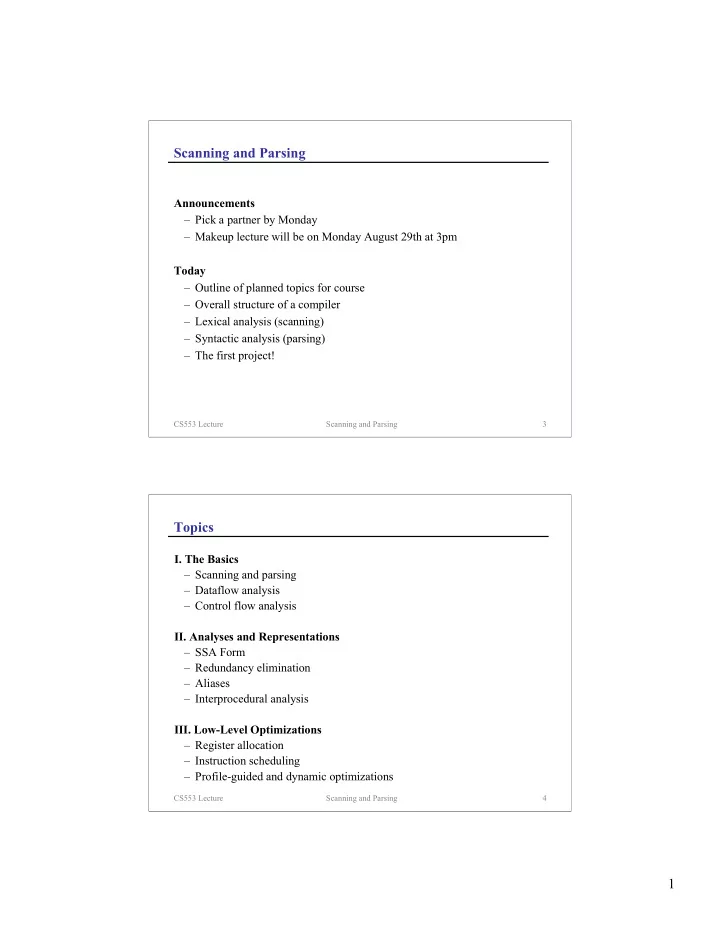

Scanning and Parsing Announcements – Pick a partner by Monday – Makeup lecture will be on Monday August 29th at 3pm Today – Outline of planned topics for course – Overall structure of a compiler – Lexical analysis (scanning) – Syntactic analysis (parsing) – The first project! CS553 Lecture Scanning and Parsing 3 Topics I. The Basics – Scanning and parsing – Dataflow analysis – Control flow analysis II. Analyses and Representations – SSA Form – Redundancy elimination – Aliases – Interprocedural analysis III. Low-Level Optimizations – Register allocation – Instruction scheduling – Profile-guided and dynamic optimizations CS553 Lecture Scanning and Parsing 4 1
Topics (cont) IV. High-Level Optimizations – Dependence analysis – Loop transformations – Tiling – Object-oriented optimizations V. Emerging Topics – Run-time reordering transformations – Security and program checking – Domain-specific program analysis and transformation CS553 Lecture Scanning and Parsing 5 Structure of a Typical Interpreter Compiler Analysis Synthesis character stream lexical analysis IR code generation tokens “words” IR syntactic analysis optimization AST “sentences” IR semantic analysis code generation annotated AST target language interpreter CS553 Lecture Scanning and Parsing 6 2
Lexical Analysis (Scanning) Break character stream into tokens (“words”) – Tokens, lexemes, and patterns – Lexical analyzers are usually automatically generated from patterns (regular expressions) ( e.g., lex) Examples token lexeme(s) pattern const const const if if if relation <,<=,=,!=,... < | <= | = | != | ... identifier foo,index [a-zA-Z_]+[a-zA-Z0-9_]* number 3.14159,570 [0-9]+ | [0-9]*.[0-9]+ “hi”, “mom” “.*” string const pi := 3.14159 ⇒ const, identifier ( pi ), assign,number ( 3.14159 ) CS553 Lecture Scanning and Parsing 7 Interaction Between Scanning and Parsing yylex() character stream IR Lexical Parser analyzer token CS553 Lecture Scanning and Parsing 8 3
Specifying Tokens with Flex Theory meets practice: – Regular expressions, formal languages, grammars, parsing… Flex example input file: %{ #include <stdlib.h> "\/\/"[^\n]*"\n" // eat up one-line comments #include "top-token.h" %} [ \t\n]+ // eat up whitespace DIGIT [0-9] {ID} { char *retstr; ID [a-zA-Z][a-zA-Z0-9]* retstr = malloc(strlen(yytext)+1); strcpy(retstr,yytext); %% yylval.sval = retstr; return T_ID; [=\{\}] { return yytext[0]; } } if { return T_IF; } %% => { return T_MAPSTO; } CS553 Lecture Scanning and Parsing 9 Recognizing Tokens with DFAs letter or digit T_ID other letter [a-zA-Z][a-zA-Z0-9]* 2 1 3 T_LTE = other < 1 4 5 6 <= [=\{\}] CS553 Lecture Scanning and Parsing 10 4
Syntactic Analysis (Parsing) Impose structure on token stream – Limited to syntactic structure ( ⇒ high-level) – Structure usually represented with an abstract syntax tree (AST) – Parsers are usually automatically generated from grammars ( e.g., yacc, bison, cup, javacc) for Example i 1 10 asg for i = 1 to 10 do a[i] = x * 5; arr tms a i x 5 for id( i ) equal number( 1 ) to number( 10 ) do id( a ) lbracket id( i ) rbracket equal id( x ) times number( 5 ) semi CS553 Lecture Scanning and Parsing 11 Interaction Between Scanning and Parsing yylex() character stream IR Lexical Parser analyzer token CS553 Lecture Scanning and Parsing 12 5
Using bison or yacc with flex or lex bison assumes that yylex() function has been defined. bison example input file: %union { char* sval; int ival; Expr* exprptr; std::list<Stmt*> stmtlistptr; }; %token <sval> T_STR_LITERAL %token <ival> T_INT_LITERAL %token T_IF T_THEN T_ELSE %type <exprptr> Expr %type <stmtlistptr> StmtList Proc: StmtList ; StmtList: StmtList Stmt | /*empty*/ ; Stmt: T_IF Expr T_THEN StmtList T_ELSE StmtList | /*other stmts*/ ; CS553 Lecture Scanning and Parsing 13 Shift-Reduce Parsing CS553 Lecture Scanning and Parsing 14 6
Parsing Terms CFG (Context-free Grammer) BNF (Backus-Naur Form) and EBNF (Extended BNF): equivalent to CFG CS553 Lecture Scanning and Parsing 15 Parsing Terms cont … Top-down parsing – LL(1): left-to-right reading of tokens, leftmost derivation, 1 symbol lookahead – Predictive parser : an efficient non-backtracking top-down parser that can handle LL(1) – More generally recursive descent parsing may involve backtracking Bottom-up Parsing – LR(1): left-to-right reading of tokens, rightmost derivation in reverse, 1 symbol lookahead – Shift-reduce parsers: for example, bison and yacc generated parsers – Methods for producing an LR parsing table – SLR, simple LR – Canonical LR, most powerful – LALR(1) CS553 Lecture Scanning and Parsing 16 7
Project 1: Scanners and Parsers for OpenAnalysis Test Input // int main() { PROCEDURE = { < ProcHandle("main"), SymHandle("main") > } // int x; LOCATION = { < SymHandle("x"), local > } // int *p; LOCATION = { < SymHandle("p"), local > } // all other symbols visible to this procedure LOCATION = { < SymHandle("g"), not local > } // x = g; MEMREFEXPRS = { StmtHandle("x = g;") => [ MemRefHandle("x_1") => < SymHandle("x"), DEF > MemRefHandle("g_1") => < SymHandle("g"), USE > ] } CS553 Lecture Scanning and Parsing 17 OpenAnalysis Problem: Insufficient analysis support in existing compiler infrastructures due to non-transferability of analysis implementations Decouples analysis algorithms from intermediate representations (IRs) by developing analysis-specific interfaces Analysis reuse across compiler infrastructures – Enable researchers to leverage prior work – Enable direct comparisons amongst analyses – Increase the impact of compiler analysis research CS553 Lecture Scanning and Parsing 18 8
Software Architecture for OpenAnalysis Clients Toolkit Intermediate Representation CS553 Lecture Scanning and Parsing 19 Project 1: Basic Outline 1) Download and build OpenAnalysis 2) Copy Project1.tar to your CS directory and build 3) Implement 3 parsers that build up certain parts of a subsidiary IR using the examples in testSubIR.cpp and Input/testSubIR.oa 4) Next week start testing FIAlias implementation in OpenAnalysis CS553 Lecture Scanning and Parsing 20 9
Concepts Compilation stages in a compiler – Scanning, parsing, semantic analysis, intermediate code generation, optimization, code generation Lexical analysis or scanning – Tools: lex, flex, etc. Syntactic analysis or parsing – Tools: yacc, bison, etc. CS553 Lecture Scanning and Parsing 21 Next Time Lecture – Undergrad compilers in a day! CS553 Lecture Scanning and Parsing 22 10
Recommend
More recommend